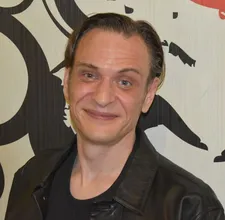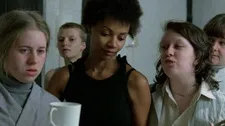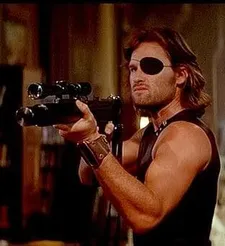This year's Edinburgh International Film Festival's retrospective strands have been woven together by senior programmer Niall Greig Fulton as a response to the vote to trigger Brexit and leave the European Union. The retrospective The Future Is History is split into three parts - Great Britain, The Western World Of The Future and Scotland.
 |
| Niall Greig Fulton: 'I do believe there is a kind of new confidence growing in Scotland that is free of restraint - I think Tom McGrath had that confidence back then.' Photo: Courtesy of EIFF |
Chatting ahead of the festival, which opens next Wednesday (June 21), Fulton explained that the retro has been a year in the planning.
"The day the vote came through was the day after we finished the Cinema Du Look retrospective," he says. "It was really pointed for me because I'd shown my favourite, The Lovers On The Bridge (Les Amants Du Pont Neuf) and we were lucky enough to have Denis Lavant and Dominique Pignon in town. Obviously, it was a bit of a shocker, to wake up from a celebration of French cinematic culture to discover that we had decided as a nation to leave the EU.
"At that point, I'd already considered HandMade Films for a number of years because of the festival's links to the company. And those links are quite big ones. In the case of Withnail And I, its screening here actually diverted the course of the film. When it was first made, HandMade weren't quite sure what to do with it. They couldn't quite place what it was and I think there was a rough feeling around that in the industry - an uncertainty.
"We screened it in Edinburgh and it just exploded at that screening. Jim Hickey (festival director from 1981 to 1988) told me there were people on the phone to London explaining it was terrific. So it helped changed the fortunes very early on. It's also very hard to ignore the fact Linda Miles (festival director from 1973 to 1980) had The Long Good Friday, directed by John Mackenzie. It's as simple as this for me, John Mackenzie is an Edinburgh-born filmmaker and he made The Long Good Friday. That, to me, is enormous. And we had the privilege of having him here with Helen Mirren."
Several of the films across the retrospective are making a return visit to the festival, including Escape From New York, Death Watch and Repo Man. The festival has also had help from STV to secure the original, undubbed version of gangland drama A Sense Of Freedom, which tells the story of Glasgow hard man Jimmy Boyle.
"That's a little bit of an end of a journey for me, because the last time we screened it and looked at Mackenzie's work, the writer Peter McDougall wouldn't go into the screening," says Fulton "He said, 'I'm not watching that, it's not my film. It's not my language. I wrote that as a young Scottish man and I don't recognise the film that is on the screen today'.
 |
| Scrubbers is "quite unmissable", says Fulton |
"That was quite sore for me because I'd programmed it and none of us had really been aware. Now, knowing the process that film was put through, I understand his point of view. They messed about with the actual framing, it wasn't just the language."
He adds: "So all these things had been milling about in my head and I knew that doing HandMade would unlock all those things. As soon as that happened, the whole idea of us leaving Europe was presented. It was a bit like, we're an international festival and with that in mind what we are bound to do - with pleasure, I might add - is present the finest of European cinema and culture. So, I thought, this Brexit decision has a bearing on us. It's not for us to make some kind of huge political statement, I don't think that's a festival's place, but I think it's utterly our place, possibly even our duty, to react artistically."
Fulton says "sculpting" the HandMade film section was important, so that he could draw out themes of identity. This meant, for example, excluding films such as Life Of Brian in favour with starting with The Long Good Friday
"I thought, if I take that off, it slightly takes away the very common perspective of looking at HandMade through Monty Python glasses," he says "The idea was to reset the tone using The Long Good Friday and use titles that were set in Britain and/or reflected eras in British culture. Even just as simple as views of past Britain. Food rationing with A Private Function, the Sixties ending with Withnail And I, you've got How To Get Ahead In Advertising taking Capitalism head on."
There are also some lesser seen films in the section - female prison drama Scrubbers and crime drama Bellman And True.
"I'd actually go as far as to say these two films are quite unmissable in this selection, says Fulton. "Scrubbers, it's Mai Zetterling, a lot more people in the past half-decade have begun to understand it's not just revolutionary because it's a film from a female perspective - you have to put it in the context of the time and of the climate within the industry, which was very biased. When you look at what Zetterling had to go through to get it made, I think it's a great example of a strong, intelligent woman at work within the industry, because it's a historical story that has a beginning and an end. It's not a filmmaker who's working now and we're seeing her story unfolding. It's about a woman who we can clearly see got involved with this project for the best of reasons, fought like a fearsome warrior through the filming and post-production with HandMade and managed to maintain artistic control to a degree."
 |
| The Long Good Friday was the starting point for the HandMade Films section. |
"The Scotland section was designed for a number of reasons," says Fulton "When HandMade was put in place, I wanted something that would reflect a similar kind of themes from the same era. It came very quickly because of A Sense Of Freedom, I thought of The Hardman and everything clicked into place."
Outlining McGrath's interest in cinema, he notes that it was the playwright who introduced him to Shirley Clarke's The Connection, which also makes a return to the festival this year.
"Tom was a man who drew from every art form," he adds.
One of the key aspects of this element of the retro is that it will "step off the screen", and it features A Script Reading of The Hard Man, starring Kate Dickie. The film festival's move from August to June has brought with it many positives - not least allowing it to expand in terms of space in the city outside the crush of the other festivals. But it's fair to say that it has, perhaps, weakened its connection to the August festivals, something that Fulton hopes some of this year's events, including a script reading of Gerard Johnson's This Story Of Yours, will help strengthen.
Fulton says: "Part of it is also to be our little celebration of all the festivals being 70. We're coming off the screen to celebrate with them.
"I do believe there is a kind of new confidence growing in Scotland that is free of restraint - I think Tom had that confidence back then. I hope that we will get a lot of younger viewers.
"The subject should be something like 'Cinema Connected'. We're dealing with artists with work that is ongoing rather than just inviting with them to present their work.
"I think any film festival anywhere in the world is always happy to have a feature that is unique to them. In that, if you think Kate Dickie as The Hard Man is an interesting thing, you've got one night only to see that - it won't be playing at the next film festival along the line. In this day and age, I think it's very important that your film festival is doing things that are unique.
"I have to mention programme manager James Rice because none of this would happen without him. He's an invaluable asset at international level. He must be one of the best in the world at tracking archive prints in the world. He's worked very hard with STV and dug up four pieces of Tom McGrath memorabilia."
 |
| Escape From New York, 'the fact that we opened with Escape From New York, is one of the coolest things I've ever heard' |
"I think there were a couple of things happening at that point. Because you had Star Wars and Alien, crucially, I think they opened certain doors. The studios began to realise that this could be something on which they could make a lot of money but they weren't sure yet. The other critical thing was the physical effects reached their zenith. If you look at the film's from 1985 to 1990, there's a huge difference, you're looking at the likes of Robocop compared to Blade Runner and Death Watch.
"I tried my best to go for a cerebral selection. I had to be quite hard and I was tough with ones where the special effects were so dated that it let it down. It was also about reflecting the festival's history, so the fact that we opened with Escape From New York, is one of the coolest things I've ever heard. So it's an absolute joy to put that back up there.
"I hope people, because of the advent of Luc Besson's Valerian, will want to have a look at The Last Battle (Le Dernier Combat). It's striking. There's a scene when it rains fish - I didn't see that again until Magnolia. Also because Besson was also so crucial to last year's Cinema Du Look, I wanted that too as a reminder."
So, what does Fulton hope audiences will take away from this year's retrospectives?
"I hope it provokes thought about art and identity. And you can't help but look at how British film and British art has changed and the difference in the way they made films then and now. Of the HandMade films, many travelled to the States, so it's also about the way Britain was projected. I hope that's thought-provoking too. Identity and art are probably the two clear things it's been designed around but I wanted to build something that did step off the ground. I'm fascinated by establishing the cultural connections."
He says that programming a big selection like this means that "you go up as many fascinating dead ends as you do freeways", adding, "I've tried to leave doors ajar."
You can read more about the festival's retrospectives in the festival's accompanying booklet, which is available online here. For tickets and to book, visit www.edfilmfest.org.uk.





















